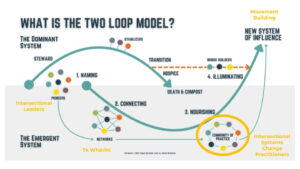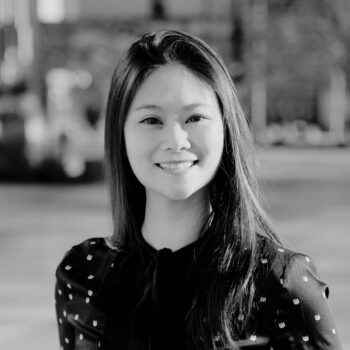
April 30th, 2025
How do we sustain intersectional leaders creating system change?
Creating an Intersectionality & Systems Change Community of Practice in Ōtautahi
In times of rapid change and growing division, leadership that embraces complexity, holds nuance, and centres humanity is not just important—it’s essential. At the heart of this kind of leadership is intersectionality: the understanding that our experiences of power, privilege, and marginalisation are shaped by the many identities we hold—whether that’s race, gender, sexuality, disability, class, or something else.
Towards the end of 2024, a diverse group of leaders, practitioners, and change-makers have come together through a co-design process to explore what it might mean to create a Community of Practice (COP) rooted in Intersectionality and Systems Change. Emerging from our Te Whāriki programme, this group asked bold, heart-centred questions:
-
How do we lead from places of lived experience, not just learned theory?
-
What would it look like if our systems were designed by and for those who are most impacted by them?
-
What kind of space do we need to sustain ourselves—and each other—on the long road to justice in Ōtautahi Christchurch?
The answers, while still unfolding, are powerful.
We’ve heard stories of people reclaiming their identity as a strength in leadership, rather than something to be minimised. We’ve witnessed the importance of spaces where people can bring their full selves—cultures, challenges, whakapapa, and all—and not feel like they have to justify their belonging. We’ve seen a hunger for communities that prioritise whanaungatanga, kotahitanga, and manaakitanga, not just in theory but in practice.
One participant reflected, “Recognising the burnout in these spaces is actually heartbreak.” Another shared that for the first time, they feel like they can be “seen” in a leadership context without having to conform. These aren’t just touching moments—they’re reminders of what’s possible when we lead with intersectionality at the centre, not on the margins.
As systems continue to polarise and dominant narratives harden, intersectional leaders are often the bridge-makers, the storytellers, and the disruptors. But they can’t (and shouldn’t) do it alone.

Why a Community of Practice?
We’re imagining a space that’s more than a professional network. This is about ongoing, relational learning—a place to be supported, challenged, and inspired. A space to design new systems together.
Whether that looks like face-to-face hui, online meetups, shared resource platforms, or collaborative projects, the goal is the same:
To sustain intersectional leadership and support the people doing the hard, brave, beautiful work of systems change.
Because systems change isn’t just policy shifts or structural reforms (though those matter).
It’s also the daily interactions, the mindsets, the language we use, and the way we show up for each other.
- It’s about shifting power.
- It’s about solidarity.
- It’s about hope.
From Seeds to Movements: Sustaining the Journey
As we’ve moved through this co-design process, we’ve been guided by Tokona te Raki’s Te Korekoreka kawa* – a kaupapa Māori process grounded in whakapapa, reflection, imagination, and collective action. Through the realms of Te Ao Tūroa, Te Kore, Te Pō, and Te Ao Mārama, we’ve explored the conditions needed to sustain intersectional leaders beyond individual programmes and into a movement for systems change.
We’ve also held in mind The Berkana Institute’s Two Loops Model, which helps us recognise where we are within broader systems transformation. It reminds us that as old systems decline, new ones emerge through the quiet, consistent efforts of pioneers—those who experiment, connect, and share what they’re learning.

We see the intersectional leaders from Te Whāriki as these pioneers.The Te Whāriki programme creates a deeply relational network where leaders journey together for a year, exploring identity, power, and practice. This shared experience builds trust, vision, and momentum. The Community of Practice (COP) is the natural next step—a place where this shared kaupapa can continue to flourish.It’s where the seeds of transformation planted in Te Whāriki can grow into something collective, sustained, and powerful:
- A community to share practice
- A space to weave connections across contexts
- A movement grounded in care, courage, and systemic action
By anchoring in Te Korekoreka and holding space for models like Two Loops, we’re charting a pathway that honours both indigenous knowledge systems and global theories of change, all in service of building a more just, inclusive, and flourishing future.
We kicked off the first hui this month. The community is still in the making and we can’t wait to see where it takes us.
We’d like to leave you with these reflection questions:
-
How do the intersecting parts of your identity shape how you lead?
-
What systems in your context need transforming—and who is most impacted by them?
-
How are you creating or contributing to spaces where others can feel safe, seen, and supported?
-
Who else needs to be in this conversation—and how might you invite them in?
If you’ve been yearning for spaces that centre inclusion, connection, and complexity—know that you’re not alone. Cups of tea, courage, and collective action are always welcome.
For now, take a moment to reflect, to breathe, and to imagine the kinds of systems we could build if we all got to bring our full selves to the table.
|
|

April 30th, 2025
How do we sustain intersectional leaders creating system change?
Creating an Intersectionality & Systems Change Community of Practice in Ōtautahi
In times of rapid change and growing division, leadership that embraces complexity, holds nuance, and centres humanity is not just important—it’s essential. At the heart of this kind of leadership is intersectionality: the understanding that our experiences of power, privilege, and marginalisation are shaped by the many identities we hold—whether that’s race, gender, sexuality, disability, class, or something else.
Towards the end of 2024, a diverse group of leaders, practitioners, and change-makers have come together through a co-design process to explore what it might mean to create a Community of Practice (COP) rooted in Intersectionality and Systems Change. Emerging from our Te Whāriki programme, this group asked bold, heart-centred questions:
-
How do we lead from places of lived experience, not just learned theory?
-
What would it look like if our systems were designed by and for those who are most impacted by them?
-
What kind of space do we need to sustain ourselves—and each other—on the long road to justice in Ōtautahi Christchurch?
The answers, while still unfolding, are powerful.
We’ve heard stories of people reclaiming their identity as a strength in leadership, rather than something to be minimised. We’ve witnessed the importance of spaces where people can bring their full selves—cultures, challenges, whakapapa, and all—and not feel like they have to justify their belonging. We’ve seen a hunger for communities that prioritise whanaungatanga, kotahitanga, and manaakitanga, not just in theory but in practice.
One participant reflected, “Recognising the burnout in these spaces is actually heartbreak.” Another shared that for the first time, they feel like they can be “seen” in a leadership context without having to conform. These aren’t just touching moments—they’re reminders of what’s possible when we lead with intersectionality at the centre, not on the margins.
As systems continue to polarise and dominant narratives harden, intersectional leaders are often the bridge-makers, the storytellers, and the disruptors. But they can’t (and shouldn’t) do it alone.

Why a Community of Practice?
We’re imagining a space that’s more than a professional network. This is about ongoing, relational learning—a place to be supported, challenged, and inspired. A space to design new systems together.
Whether that looks like face-to-face hui, online meetups, shared resource platforms, or collaborative projects, the goal is the same:
To sustain intersectional leadership and support the people doing the hard, brave, beautiful work of systems change.
Because systems change isn’t just policy shifts or structural reforms (though those matter).
It’s also the daily interactions, the mindsets, the language we use, and the way we show up for each other.
- It’s about shifting power.
- It’s about solidarity.
- It’s about hope.
From Seeds to Movements: Sustaining the Journey
As we’ve moved through this co-design process, we’ve been guided by Tokona te Raki’s Te Korekoreka kawa* – a kaupapa Māori process grounded in whakapapa, reflection, imagination, and collective action. Through the realms of Te Ao Tūroa, Te Kore, Te Pō, and Te Ao Mārama, we’ve explored the conditions needed to sustain intersectional leaders beyond individual programmes and into a movement for systems change.
We’ve also held in mind The Berkana Institute’s Two Loops Model, which helps us recognise where we are within broader systems transformation. It reminds us that as old systems decline, new ones emerge through the quiet, consistent efforts of pioneers—those who experiment, connect, and share what they’re learning.

We see the intersectional leaders from Te Whāriki as these pioneers.The Te Whāriki programme creates a deeply relational network where leaders journey together for a year, exploring identity, power, and practice. This shared experience builds trust, vision, and momentum. The Community of Practice (COP) is the natural next step—a place where this shared kaupapa can continue to flourish.It’s where the seeds of transformation planted in Te Whāriki can grow into something collective, sustained, and powerful:
- A community to share practice
- A space to weave connections across contexts
- A movement grounded in care, courage, and systemic action
By anchoring in Te Korekoreka and holding space for models like Two Loops, we’re charting a pathway that honours both indigenous knowledge systems and global theories of change, all in service of building a more just, inclusive, and flourishing future.
We kicked off the first hui this month. The community is still in the making and we can’t wait to see where it takes us.
We’d like to leave you with these reflection questions:
-
How do the intersecting parts of your identity shape how you lead?
-
What systems in your context need transforming—and who is most impacted by them?
-
How are you creating or contributing to spaces where others can feel safe, seen, and supported?
-
Who else needs to be in this conversation—and how might you invite them in?
If you’ve been yearning for spaces that centre inclusion, connection, and complexity—know that you’re not alone. Cups of tea, courage, and collective action are always welcome.
For now, take a moment to reflect, to breathe, and to imagine the kinds of systems we could build if we all got to bring our full selves to the table.
|
|


